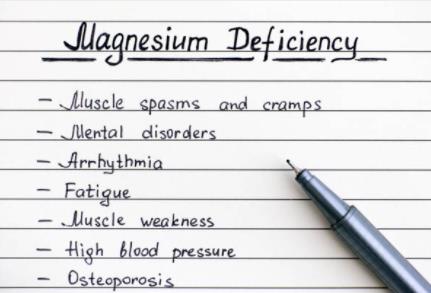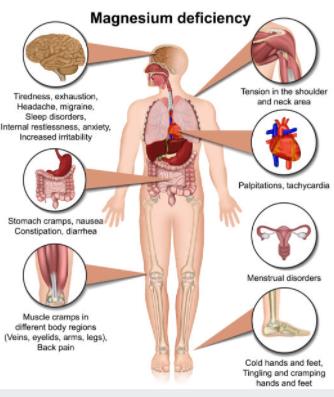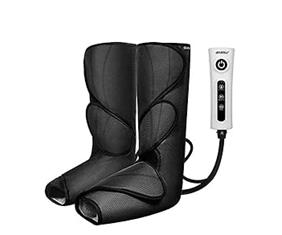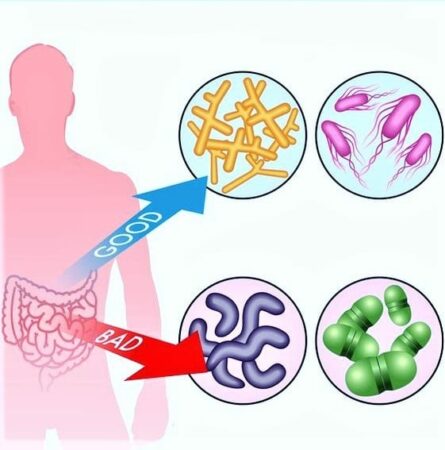
Essential for Both Men and Women, however, Magnesium Benefits for Women can help fight against these 8 Signs Due to Magnesium Deficiency Women face in Life.
Magnesium Benefits For Women
Overview
Magnesium is an essential mineral that plays a vital role in our health and is required for over 300 interactions within the body.
Magnesium is commonly found in many foods and in reality, should be sufficient to maintain a proper balance in our lives.
For women, Magnesium deficiency can create many other issues, especially for those suffering from PMS along with Pregnant or expecting Mothers.
Disclaimer:
I am an affiliate for various programs, and as such should you purchase any products from the links that I provide, I may receive a small commission as a result of the sales at no cost to you.
Why Supplements may be needed
Soil:
Unfortunately, for various reasons, the deterioration of soil has found magnesium levels to be lower and can affect the levels commonly found in fruits and vegetables.
Processed and Fast Foods:
Changes to eating more processed foods found in many fast foods and various western diets is an issue as the magnesium present may not be adequate if there is any present.
Nut allergies:
You will find many nuts contain high levels of magnesium the unfortunate part is that this doesn’t help those with nut allergies.
Meat:
Meat is also a good source of magnesium, the issue here is for vegans who don’t eat meat, so this takes away opportunities to gain much-needed magnesium in their restricted diet.
Vitamin D/Calcium:
We always hear about how vital taking vitamin D and calcium is for our bodies.
Did you realize that without an adequate amount of Magnesium, Vitamin D cannot function properly on its own to the point it becomes almost ineffective?
These are just some of the reasons why taking Magnesium supplements can be beneficial for you, especially if you fall in one of the groups mentioned above.
Low magnesium levels are serious:
When Magnesium levels are too low, over a long-term period other situations may occur.
Issues such as:
- High blood pressure
- Clogged arteries
- Diabetes (in particular, type 2 diabetes)
- Osteoporosis
- Stomach pain and cramps: many women face during their menstrual cycles both before and during their periods.
All of these can affect your health when your Magnesium levels are very low.
How does magnesium help the body?
Magnesium is needed in many ways for the maintenance of our nerve and muscle function.
- It will help to maintain a balanced immune system.
- Adjusts your blood glucose levels.
- Helps women before and during their menstrual cycles along with period cramps many face during this time.
Studies worldwide have seen around 80-90% of women suffer from PMS with approximately 3-8% can be quite severe.
Further studies have shown that women who suffer from period cramps have low levels of Magnesium in their bodies than those not suffering from PMS.
This is why it is vital to ensure you get your recommended daily amounts for a healthy body and life issues.
What is Magnesium?
Magnesium is a vital nutrient found within the body essential in helping maintain a balance with the functioning of nerves, muscles, and bones to help regulate blood sugar and blood pressure.
You will also find magnesium helps support the immune system.
Magnesium deficiency can create long-term issues that may lead to migraines, diabetes, osteoporosis, and heart issues such as heart attack or stroke.
What Does Magnesium Do?
When Magnesium is at Low levels, this prevents Vitamin D from functioning, regardless of whether the body has enough vitamin D in the body.
It also plays a pivotal role in maintaining Calcium and Potassium levels.
Magnesium has anti-inflammatory properties that may prevent or reduce blood clotting.
This is very beneficial for women suffering from strong pains and cramps during their periods.
Low levels of magnesium can lead to headaches, migraines, nausea, fatigue, and weakness to name a few.
A depleted level of magnesium can create muscle cramps, numbness, and even mood swings and fatigue.
8 Signs of Magnesium Deficiency in Women.

Period Cramps

When your uterus muscles contract, menstrual cramps occur, which can range from mild to severe pain.
This can also lead to other issues such as water retention, tiredness, irritability, and mood swings.
Of course, having a hot water bottle and taking some medication such as aspirin or ibuprofen can help.
This will lessen headaches and stomach cramping temporarily but only to face the same issues next month.
Magnesium supplements can improve such symptoms during this time.
Ensuring you maintain the needed Magnesium levels daily will help to either lessen the pain the following month or even take away the pain completely.
Headaches and/or Migraines Due to PMS

During the menstrual cycle, your hormones produce estrogen and progesterone while lowering magnesium levels.
As a result of the low magnesium level, headaches, and migraines start to occur during this time.
Another reason why taking some form of magnesium supplement or foods high in magnesium will be of added benefit.
Maintaining a balanced level can relieve you from those unnecessary and often painful headaches or migraines.
Blood pressure
Important to monitor your blood pressure
Magnesium helps regulate blood pressure to dilate the blood vessels and dissolve blood clots which are another issue for women during their monthly cycle.
Blood clots together with muscle spasms can create severe pain.
If you suffer from heavy periods, you can benefit as there will be fewer blood clots to deal with.
Food Cravings

Similar to pregnancy, PMS cravings can occur at any time. During the menstrual cycle, you will find that your serotonin levels drop.
You will find a craving mainly for foods with carbohydrates which in turn creates more serotonin.
Serotonin is also a hormone that regulates moods, anxiety, and happiness.
So if this occurs, make sure your cravings head towards dark chocolate (not the tasty kind but dark chocolate).
Dark chocolate contains high levels of magnesium, just be aware of the possible higher sugar levels.
Moodiness

I am talking about moodiness during the menstrual cycle not the normal kind with your partner.
During your cycle, you will find all sorts of feelings like sadness, irritability, and anger, all of which can be unexplained and triggered quickly.
Similar to cravings, the lower the serotonin, the lower the mood will be, for some, can also lead to depression.
Getting enough Magnesium helps to convert an amino acid called tryptophan to serotonin and in doing so, increases your mood swings to a more balanced mode.
Well, as balanced as can be if you have a partner.
As Magnesium helps with mood swings, you will find this can also help you get a better night’s sleep. a double whammy for you.
Pregnancy

Increased Magnesium Levels Helps Build and Repair Body Tissue During Pregnancy
If you are pregnant, (congratulations by the way), you will find that good magnesium levels will help to build and repair body tissue.
While severe magnesium deficiency during pregnancy can lead to poor fetal growth and infant mortality.
Please ensure you are always in contact with your doctor during pregnancy, and even more so if facing any other issues along the way.
Better to be safe than sorry.
For added Relief try the Comfier Heating Pad to take away those painful moments. Helps to relieve lower back muscle tension, abdomen pains, menstrual cramps, and stomach discomfort and enhances blood circulation. A must for you if pregnant.
Leg Cramps as a result of pregnancy

The stressors of carrying extra weight during pregnancy are bad enough on the back, not to mention the leg cramps experienced are painful enough.
Getting enough of your magnesium can help to relax the muscle along with involuntary twitching that also may occur.
Cincom Leg Massager is ideal for leg Cramps, sore leg muscles, or even just standing on your feet for a long period.

Osteoporosis

Magnesium may help fight and prevent Against Osteoporosis
As magnesium deficiency prevents vitamin D and calcium from functioning correctly, you may also find a reduced estrogen level over a long period can gradually develop into Osteoporosis.
Osteoporosis results in the bones becoming weak, thin, and very fragile to the point where bones can easily fracture or break with the smallest of knocks.
Due to the bones becoming so weak, even a simple fall can easily result in injury and unfortunately, for some, death.
How Much Magnesium Do Women Need?
Recommended Amount for Women
The amount can vary depending not only on the ages of women but also the individual circumstances such as pregnancy, age, and breastfeeding, along with the standard recommendation of daily magnesium requirements.
- Ages 14 to 18 360 mg/day
- Ages 19-30 310 mg/day
- Pregnant Teens 400 mg/day
- Women 19-30 years 310-320 mg/day
- Women 31 and older 320 mg/day
- Pregnant women depending on age 350-360 mg/day
- Breastfeeding women depending on age 310-320 mg/day
For a full detailed list of all ages and sexes, you can check it out here.
Where Can You Get Magnesium?

Many foods particularly green and dark leafy vegetables such as spinach, and kale contain good sources of magnesium.
Other foods are avocados, legumes, whole grains, nuts, and dark chocolate (beware of too much chocolate due to higher sugar levels and for those suffering from nut allergies).
There are also other types of products that can provide you with the necessary magnesium.
Some can come in the form of sprays, supplements, bath crystals, Oils, creams, and much more, all for you and your health and see which can and will benefit you according to your individual needs.
Side effects and interactions with medication.
Some magnesium supplements can interact with various forms of medication you may take.
Antibiotics:
Antibiotics may not work as efficiently if taken too early or even after having a magnesium supplement.
Diuretics:
Depending on the type and purpose of the diuretic taken, this may lower the magnesium level due to excess urine.
Diarrhea:
Magnesium supplements can cause the stool to be softened which may result in diarrhea, quite often, this may be the case when too much is taken.
Other side effects:
Apart from Diarrhea, you may find cramps may occur and even nausea, a lower level of serotonin is also a creator of Nausea.
Zinc supplements: it has been found that those taking high doses of Zinc supplements may create issues in not allowing the body to absorb magnesium to work effectively.
Risks:
If you are a diabetic and have a history of heart or kidney disease or issue or any internal disease should not take magnesium until you have discussed this with your doctor or other qualified health physicians.
Professional Advice
Before taking magnesium, in particular supplements, always consult your doctor, pharmacist or other qualified health care specialist for individual assessment.
Never assume, instead, play safe and check with a professional rather than be sorry later.
Conclusion
I hope the article has been of benefit to you.
Now you can see and understand how magnesium can benefit your overall health, but also what the many Magnesium Benefits for Women are available.
Ensuring that your magnesium levels are balanced can help those days during your monthly cycle rather than having to deal with unnecessary cramps and pain you may have during PMS you may have now.
If you have any questions or comments, please leave them below, and I will get back to you ASAP.









